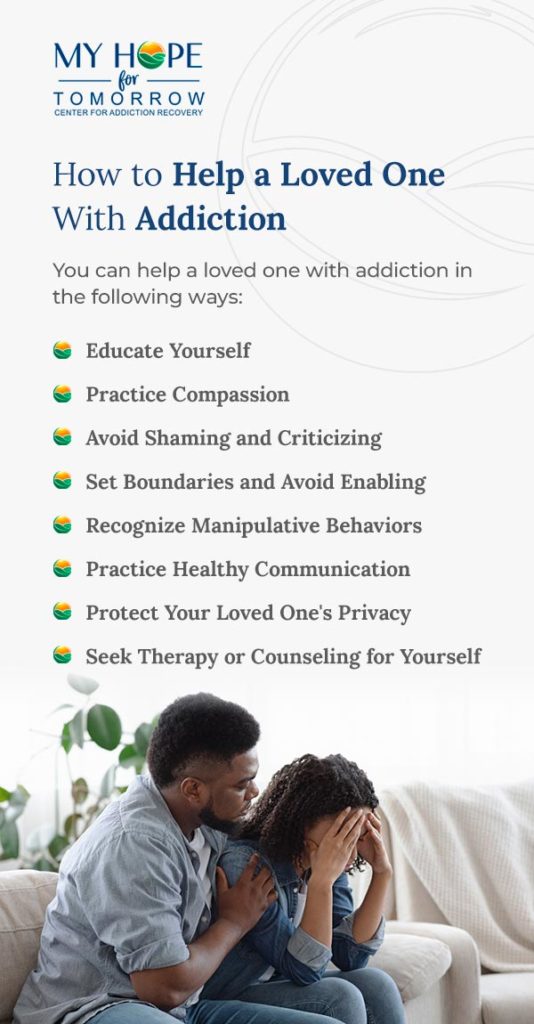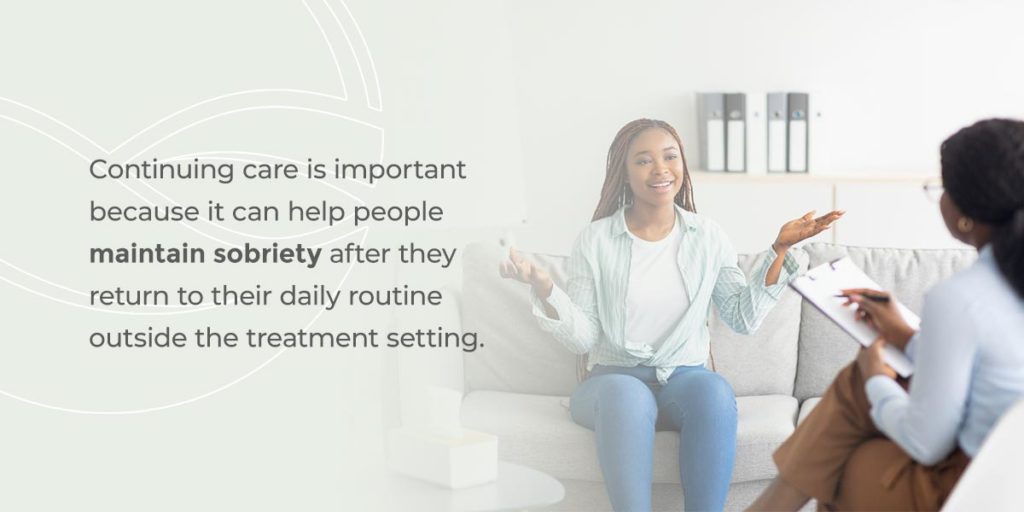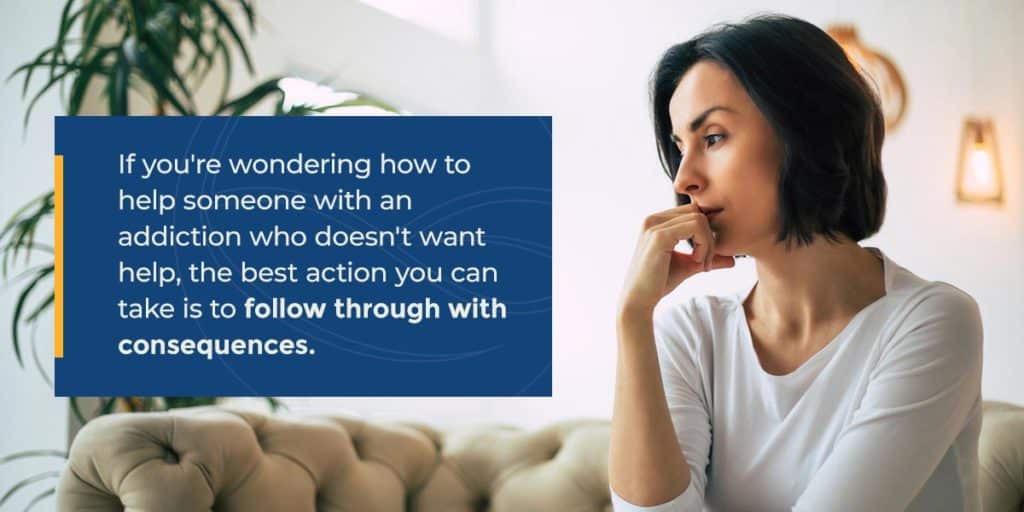

Helping someone with an addiction may feel challenging, but you can be an incredible source of hope and support for a loved one facing a substance use disorder. Addiction is a disease that requires effective treatment for individuals to achieve recovery. Learning how to help someone struggling with an addiction is essential because educating yourself helps you offer healthy support without enabling harmful behaviors. Continue reading to learn more about how you can help a loved one seek recovery from addiction.
Understanding how to support a person with an addiction is the first step toward helping them pursue recovery and find hope. While you can’t force a family member, friend or significant other to seek treatment for their substance use disorder, you can support them when they are ready to seek help. You can help a loved one with addiction in the following ways:
One of the best ways to help someone with an addiction is to educate yourself about their substance use disorder. Learning about addiction can help you better understand what your loved one is going through and how you can support them. You can educate yourself by learning about the following factors:
Understanding your loved one’s addiction can help you extend compassion toward them. Some people who have never had an addiction may view it as a choice or a character flaw, but it is actually a disease. Having compassion for your loved one can help them feel supported and hopeful. Extending compassion can also build trust between you and the person you want to help.

To extend compassion, avoiding criticism and shame is essential. While tough love is an important part of helping a loved one recover, you should never blame your loved one for their addiction. Addiction can have various causes, such as mental health conditions, stress and trauma, so your loved one is not directly to blame for their disease. Avoid shaming or outright criticizing a loved one with your words.
Shaming your loved one can hinder their recovery process, but enabling them is also harmful. You can help your loved one without shaming them by setting healthy boundaries. Allowing your loved one to experience the consequences of their addiction helps them understand why they need to stop. Protecting them from consequences enables them to continue harmful behaviors, so it’s important to avoid consistently rescuing them from the negative outcomes of their substance use.
Part of setting healthy boundaries is recognizing manipulative behaviors and saying no when you need to. If your loved one refuses treatment, they will most likely continue feeding their addiction in any way possible. They may lie or use guilt to manipulate you into supporting their addiction, but it’s crucial to maintain your boundaries even if they try to make you feel guilty.
You cannot talk someone into seeking help and recovering from addiction unless they truly want to change. However, you can communicate honestly and encourage them to work toward change. You can communicate effectively in the following ways:
Your loved one deserves privacy as they recover from addiction. Avoid venting about their challenges with friends or family, and make sure you only discuss information they are comfortable with you discussing. If you attend counseling, therapy or 12-step meetings with them, ensure what they say in the sessions stays in that room.
It’s also important to respect your loved one’s privacy regarding what they are comfortable sharing with you. Avoid pressuring them to share any details they discuss with their therapist, counselor or sponsor that they are not comfortable sharing.
Self-care is essential, especially when you are helping a loved one with an addiction. Neglecting your own well-being to care for your friend, family member or significant other’s addiction can lead to codependency, so you must make time to care for yourself. Make sure you take time for the following healthy activities:
While you can’t force a loved one to seek treatment or do their recovery work for them, you can help them explore their options. Help your friend, family member or significant other find the treatment or combination of treatments that are right for them by learning about the following options:
Peer-support groups and the 12-step program help individuals know that they are not alone in their recovery journey. Your loved one can attend in-person or online meetings to find support from others who are experiencing or have experienced similar challenges. Attending support groups is an excellent opportunity for individuals to find hope in others’ stories about how they overcame their addictions.
Residential treatment provides individualized full-time care for those who need intensive rehabilitation from addiction. If your loved one needs access to 24/7 medical care, inpatient treatment may be the best option for them. With residential inpatient treatment, individuals receive care in a private room and join a community focused on recovery. Nursing, medical and counseling teams care for patients with the following treatments:
Outpatient therapy is a part-time treatment option for individuals with mild or moderate addiction. Outpatient therapy allows patients to participate in treatment around their personal schedule, so they can use time outside of rehab to fulfill work or parenting responsibilities. Your loved one may benefit from outpatient therapy if they need a flexible treatment schedule. With outpatient therapy, they receive the same rehabilitation services offered in inpatient treatment, so they can work through recovery while tending to their outside responsibilities.
Intensive outpatient treatment is another flexible treatment option for individuals who have responsibilities outside of recovery. It’s a structured psychological treatment plan that allows people to attend during the times and days that work best for them. This type of treatment plan does not typically require detox, and it can address other mental health conditions, such as anxiety and depression.
Your loved one can also combine intensive outpatient treatment with other treatment options, such as partial hospitalization programs and residential treatment. Intensive outpatient treatment connects individuals with others who share similar experiences and allows them to learn healthy coping mechanisms so they can identify addiction triggers and maintain sobriety following treatment.
Individual and group therapy is an important part of inpatient and outpatient treatment programs, but people experiencing addiction can also participate in therapy outside of these programs. Support groups, individual therapy sessions and group therapy sessions can offer incredible hope for individuals during and after addiction treatment. You can help your loved one seek various forms of counseling services to address their needs and help them find hope.
Some people facing addiction also benefit from medication-assisted treatment (MAT). MAT eases withdrawal symptoms in patients recovering from opioid use disorder. Suboxone® is approved by the Food and Drug Administration (FDA) and blocks opioid receptors in the brain to gradually curb drug cravings.
Vivitrol® is an injectable FDA-approved medication that interrupts dopamine release in the brain and treats physical dependence. Both Vivitrol® and Suboxone® can prevent relapse and address the physical challenges of recovery.

After your loved one completes treatment, they can receive continued support through a continued care program personalized to their needs. Continuing care is important because it can help people maintain sobriety after they return to their daily routine outside the treatment setting. Encouraging your loved one to seek continuous care following treatment is an excellent way to offer support. In a continuing care program, your friend, family member or significant other can receive further counseling, support and treatment as they live a sober life full of hope.
Continue supporting your loved one as they work through recovery. If you participate in the treatment process, you can continue supporting them in the following ways:
When a person you care about is ready to end their substance use and work toward recovery, they will need to adopt a new lifestyle that supports their recovery. Treatment and counseling help individuals with addiction develop the following skills and habits to effectively deal with it:

An individual with an addiction must want help and support in order to receive it. If you offer to help a loved one experiencing addiction and they decide to continue abusing a substance, it is not your fault. In this type of situation, it’s important that you do not enable their behavior, but you cannot force them to seek treatment.
If you’re wondering how to help someone with an addiction who doesn’t want help, the best action you can take is to follow through with consequences. If you establish consequences for your loved one’s behavior without actually enforcing them, your loved one may not take the potential repercussions seriously. While it may feel hurtful to enforce consequences for your loved one, the negative impacts of their behaviors may be what saves their life.
Allowing an individual to use a substance without consequences leaves them in a comfortable space to continue using the substance. Experiencing the uncomfortable and negative impacts of their substance use may be what they need to desire treatment and pursue recovery. If you say you will enforce a consequence, such as taking away a car, leaving someone or forcing them to leave your home if they continue using a substance, it’s crucial to follow through with your statements.

You can be an invaluable source of hope for a friend, significant other or family member experiencing an addiction. Addiction is a disease that requires treatment, such as counseling, behavioral therapy and sometimes medical care. While you can’t make a loved one want help or do their recovery work for them, you can offer support, set healthy boundaries and help them explore treatment options when they are ready.
If your loved one is ready to seek help, you can help them explore their options and find support at Hope For Tomorrow. Hope For Tomorrow offers various addiction treatment programs personalized to meet each individual’s unique needs.
Whether your loved one needs inpatient treatment, outpatient treatment, medication-assisted treatment, counseling services or a combination of these options, our door is open for them to make a positive change in their life. Help your loved one contact Hope For Tomorrow to start exploring their treatment options and begin a journey toward hope and recovery.